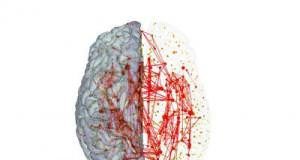Highways Of The Brain: High-Cost And High-Capacity
A new study proposes a communication routing strategy for the brain that mimics the American highway system, with the bulk of the traffic leaving the local and feeder neural pathways to spend as much time as possible on the longer, higher-capacity passages through an influential network of hubs, the so-called rich club.
Apple Peel Compound Boosts Brown Fat, Reduces Obesity In Mice
Obesity and its associated problems such as diabetes and fatty liver disease are increasingly common global health concerns. A new study by University of Iowa researchers shows that a natural substance found in apple peel can partially protect mice from obesity and some of its harmful effects.
Keeping Pace: Walking Speed May Signal Thinking Problems Ahead
A new study shows that changes in walking speed in late life may signal the early stages of dementia known as mild cognitive impairment (MCI). The research is published in the June 12, 2012, print issue of Neurology®, the medical journal of the American Academy of Neurology.
Don’t Feel Like Exercise? Scientists Find Compound That May Help You...
As science rushes to develop safe weight loss drugs, a new research report approaches this problem from an entirely new angle: What if there were a pill that would make you want to exercise harder? It may sound strange, but a new research report appearing online in The FASEB Journal suggests that it might be possible.
Early Gut Bacteria Regulate Happiness
UCC scientists have shown that brain levels of serotonin, the 'happy hormone' are regulated by the amount of bacteria in the gut during early life. Their research is being published June 12 in the international psychiatry journal, Molecular Psychiatry.
Lack Of Sleep Makes Your Brain Hungry
New research from Uppsala University shows that a specific brain region that contributes to a person's appetite sensation is more activated in response to food images after one night of sleep loss than after one night of normal sleep. Poor sleep habits can therefore affect people's risk of becoming overweight in the long run.
Brain Scans Show Specific Neuronal Response To Junk Food When Sleep-Restricted
The sight of unhealthy food during a period of sleep restriction activated reward centers in the brain that were less active when participants had adequate sleep, according to a new study using brain scans to better understand the link between sleep restriction and obesity.
Natural Antioxidant Can Protect Against Cardiovascular Disease
University of Minnesota Medical School researchers have collaborated with the School of Public Health and discovered an enzyme that, when found at high levels and alongside low levels of HDL (good cholesterol), can dramatically reduce the risk of cardiovascular disease.
Low-Dose Vitamin D May Not Prevent Fractures In Healthy Women –...
Vitamin D and calcium are dietary requirements, but it's unclear how much is best for us. New draft findings by the United States Preventive Services Task Force conclude that for healthy, postmenopausal women, daily supplementation with low levels of vitamin D -- up to 400 international units -- combined with 1,000 milligrams of calcium, does not reduce fracture risk.
Top Risk Of Stroke For Normal-Weight Adults: Getting Under 6 Hours...
Habitually sleeping less than six hours a night significantly increases the risk of stroke symptoms among middle-age to older adults who are of normal weight and at low risk for obstructive sleep apnea (OSA), according to a study of 5,666 people followed for up to three years.
How Infection Can Lead To Cancer
One of the biggest risk factors for liver, colon or stomach cancer is chronic inflammation of those organs, often caused by viral or bacterial infections. A new study from MIT offers the most comprehensive look yet at how such infections provoke tissues into becoming cancerous.
Sick From Your Stomach: Bacterial Changes May Trigger Diseases Like Rheumatoid...
The billions of bugs in our guts have a newfound role: regulating the immune system and related autoimmune diseases such as rheumatoid arthritis, according to researchers at Mayo Clinic and the University of Illinois at Urbana-Champaign.














